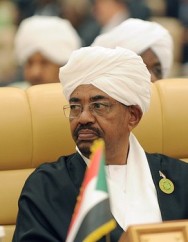Sudanese president returns home after performing Hajj
October 20, 2013 (KHARTOUM) – The Sudanese president Omer Hassan al-Bashir returned home from Saudi Arabia on Sunday after performing the Islamic pilgrimage ritual known as Hajj after a week-long stay there.

Bashir did not meet with King Abdullah bin Abdulaziz or any other senior Saudi official during his visit. The Saudi monarch had held separate talks with the Turkish and Pakistani presidents who also performed Hajj this year.
However, the Sudanese president attended a reception hosted by the Saudi Crown Prince Salman bin Abdulaziz for foreign dignitaries and heads of Haj missions.
Last November, the Sudanese head of state traveled to Saudi Arabia for medical checkup but also failed to meet any senior Saudi official despite state media reporting that he will meet with the King among others.
This is Bashir’s first trip to Saudi Arabia after Riyadh blocked a plane carrying him last August from passing its airspace on his way to Iran to attend presidential inauguration ceremony of Hassan Rouhani.
Saudi authorities emphasized that Khartoum did not obtain prior clearance for the flight but Sudanese officials insist that they have followed all required procedures.
Notably neither the Saudi Royal Court nor its foreign ministry made any comment on the issue and let Saudi Arabia’s General Authority of Civil Aviation (GACA) handle it.
The Sudanese government later sought to downplay the issue for fear of alienating a major political and financial power, analysts say.
Some observers speculated that Sudan’s growing ties with Iran could have irked the Saudis prompting them to block Bashir’s flight but Riyadh denied that this incident was politically motivated.
Another potential issue of tension was averted this month when Sudanese foreign ministry distanced itself from pro-government columnists who accused Saudi Arabia of backing the fuel subsidies protests.
Last week, the Saudi-owned al-Hayat newspaper reported that Bashir secretly dispatched two of his aides to two unnamed Arab Gulf states to contain tensions over Khartoum’s ties with Iran.
The Sudanese government has allowed Iranian warships to dock in Port Sudan three times since last year but denied that its a sign of a military alliance that is directed against any nation.
The Saudi pro-government Al-Riyadh newspaper blasted Khartoum over the Iranian warships, questioning the logic behind the relationship between the two countries in a heavily critical editorial published last year titled “The fall of masks between Iran and Sudan”.
“Bashir’s government resorting to a state that is in political and security odds with most Arab countries has no logical justification,” the newspaper said.
The editorial accused the Sudanese government of “conducting naive policy”, saying it had turned the country, despite its enormous potential, into a marginalised nation that is unable to attract Arab or foreign investors.
Yesterday the Sudanese foreign minister lauded relations with Arab Gulf states saying they are “stable” in the political and economic fields.
(ST)
